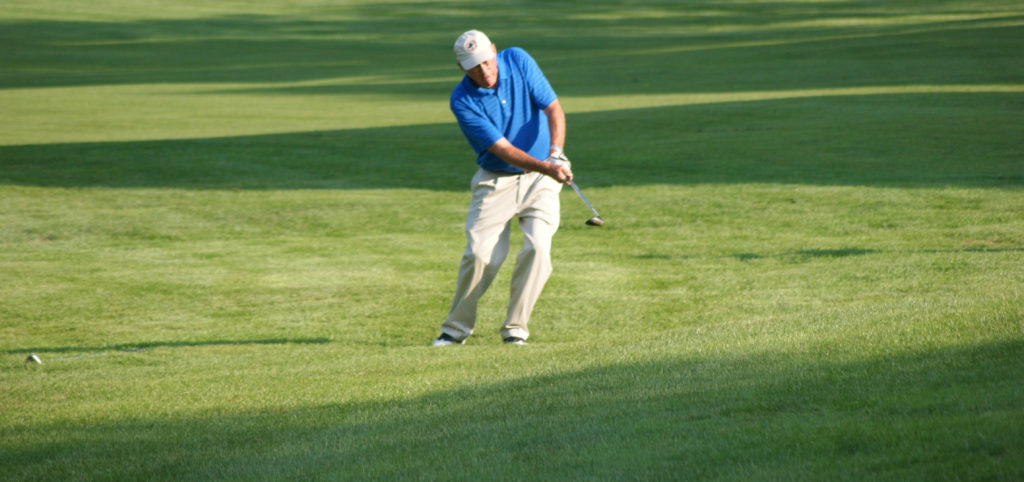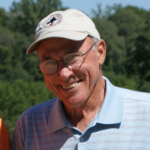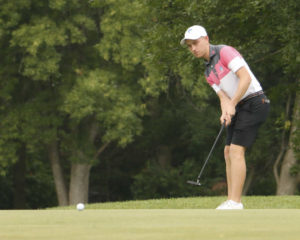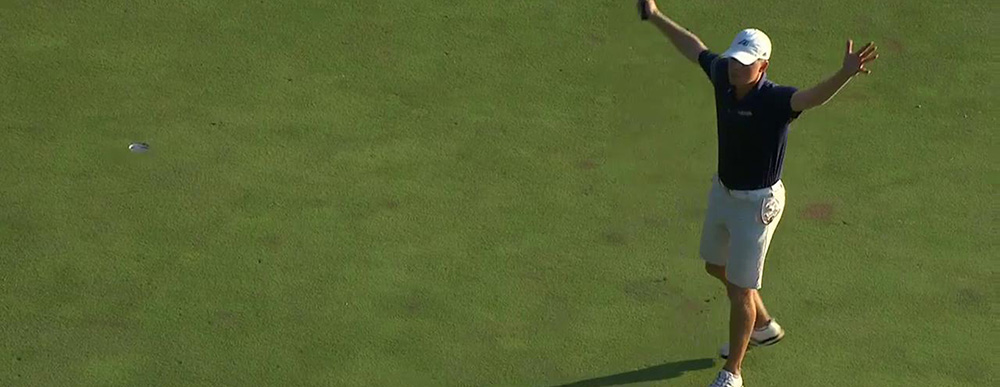By RICK BROWN
Iowa Golf Association
Broc Everett committed himself to golf by accident.
He played baseball and golf at West Des Moines Valley High School, but was unsure which sport he wanted to pursue in college.
“I was waffling back and forth between the two,” said Everett, a left-handed pitcher. “And then I was in a car accident and separated my shoulder.”
A high school junior at the time, Everett was leaving Hickory Park Restaurant in Ames after playing in the Iowa Masters.
“My foot slipped off the brake, and I hit the accelerator,” Everett said. “It was unfortunate.”
The accident ended his baseball season, and pushed him to golf.
“It wasn’t a moment where I thought this is destiny, or anything like that,” Everett said.
Lightly recruited, Everett got some interest from Augusta University . He headed to Georgia as a walk-on, redshirted his first year and poured his heart and soul into golf. Five years later, he introduced himself to the nation.
Everett, 23, won the individual NCAA Championship in May at Karsten Creek Golf Club in Stillwater, Okla. He beat Brandon Mancheno of Auburn on the first hole of their sudden-death playoff, rolling home a 15-foot birdie putt.
When he looks at a list of NCAA champions, Everett will forever see his name alongside the likes of Jack Nicklaus, Hale Irwin, Ben Crenshaw, Phil Mickelson and Tiger Woods.
“Kind of a nice reward for all the hard work,” Everett said. “It’s cool to see my name there for sure.”
Everett became the third player with Iowa roots to win an NCAA title. James Hubbell of Des Moines, playing for Harvard, won the 1916 championship at Oakmont. And Clark Burroughs of Ohio State, who grew up in Waterloo before moving to Overland Park, Kan., when he was in high school, was the 1985 champion.
Everett never won a major amateur title in the state of Iowa. His Augusta bio lists a third-place finish at the Ottumwa Amateur and a runner-up finish in the Des Moines City as his best showings. But Everett said he grew through the competition.
“We’ve got great players in the state of Iowa,” Everett said. “You’ve got guys like Gene Elliott and Mike McCoy. There’s always good competition, even though it’s a short season. People think that if you’re from Iowa, you can’t compete with guys from Florida, or Georgia, or Texas. It’s not true. If you take care of the details, you can compete at the next level.”
Everett’s first career victory came in his last college event. To those who don’t know his story, the NCAA title made him an overnight sensation.
But it took a lot of hard work and Midwestern work ethic for Everett to get there.
He said he was 3 or 4 years old when he was introduced to golf, tagging along with his dad, Larry, at the Des Moines Golf and Country Club, or swinging a club in his own back yard.
A lefty, Everett said the family contemplated switching him to the other side of the ball because it would be easier to find clubs.
“But my mom (Mary) said that she liked my swing too much left-handed,” Everett said.
He headed to Augusta with no promises, only an opportunity. And he made the most of it. The secret, as Ben Hogan always said, was in the dirt.
Everett, who was never the No. 1 man on the golf team at Valley, became a range rat at Augusta. He became a fixture at the program’s first-class practice facility.
That’s where he crossed paths with PGA Tour player Wesley Bryan, who won the 2017 RBC Heritage. Bryan’s wife went to medical school at Augusta, and he used the practice facilities as well.
“We were both out there all the time,” Everett said. “He would say, “Hey, do you want to go out and play?’ We’d have chipping contests for three hours some days, especially once I started getting better. That’s when I really started honing in on my game. He’s always pushing you, and he’s not afraid to get on you if he thinks you’re not doing what you’re supposed to.”
Asked if he was surprised at Everett’s NCAA success, Bryan said, “Surprise isn’t the right word. I knew he had been playing really well leading up to (the NCAAs). But all the best golfers in the entire country are there in one tournament. It’s a surprise when anyone wins. But there’s no doubt he has the game. He’s one of the toughest golfers I’ve ever played with. He gets a lot out of his round. He’s a grinder. Any time he gets in contention, you’ve got to like his chances.”
Less than a week after the NCAAs, Everett made his pro debut at the Freedom 55 Financial Open on the MacKenzie Tour-Canada. He played in four events, and missed every cut.
“I wish I would have taken that first week off,” said Everett, who was the No. 1 man on the Augusta team the past two seasons. “There were so many things happening all at once. I kind of forgot, “Hey, I still need to go out there and compete.’ I was going through the motions the first two weeks.”
The day after winning his NCAA title, Everett got a phone call from John Deere Classic director Clair Peterson offering a sponsor’s exemption.
“I didn’t even realize it would be on the table that quickly,” Everett said. “But I’m thankful he got me into the event so fast.”
Everett shot a bogey-free 4-under-par 67 in the opening round. That included a birdie on the first hole of his PGA Tour career.
“One of the caddies came up and said, “Welcome to the PGA Tour,’ ” Everett said.
A second-round 74 left him on the wrong side of the cut line, but Everett showed some encouraging flashes during his major-league debut.
He plans to stay in West Des Moines and practice at the Des Moines Golf and Country Club this summer. He’s unsure of his schedule. He’ll return to Augusta this fall, where he’s still got an apartment and the use of those practice facilities.
“He rolls the ball about as good as anybody I’ve ever seen,” Bryan said. “And there’s no doubt in my mind that mentally and strategically he’ll pick apart a golf course as good as anybody. And his short game is really good. I’d say he’s got some work to do in the full swing department. But there’s no doubt there’s potential there. Because his short game is definitely deadly.”






 After South Africa’s Ian Snyman became the first international player to claim the Northwest Amateur Tournament crown a year ago, Jackson Kalz (right) continued the trend during a water logged, 96th edition of the tournament, finishing at 12-under par to take the title by three strokes.
After South Africa’s Ian Snyman became the first international player to claim the Northwest Amateur Tournament crown a year ago, Jackson Kalz (right) continued the trend during a water logged, 96th edition of the tournament, finishing at 12-under par to take the title by three strokes.





